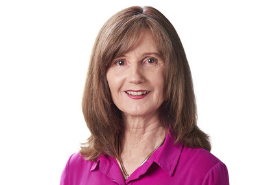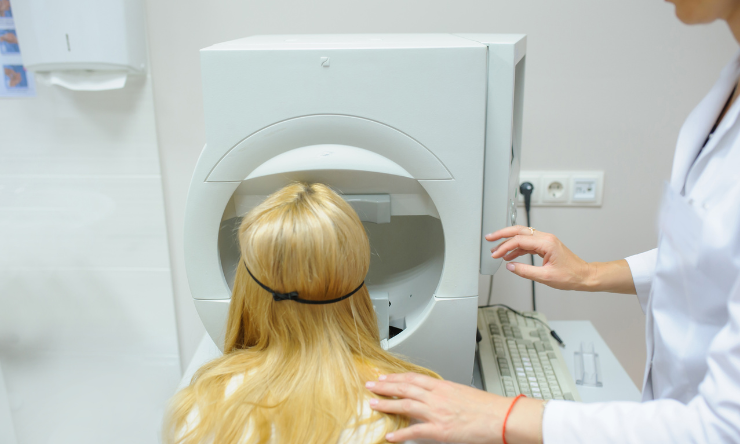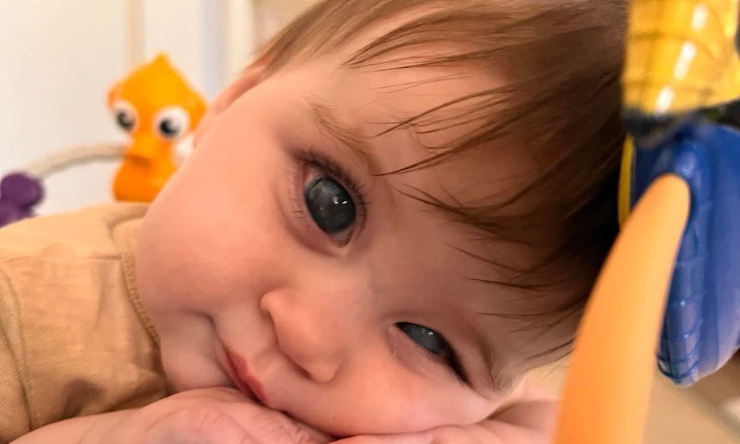Share
During World Glaucoma Week (10 – 16 March) volunteer Gaela Hildtich spoke with Vision Australia Radio host Stella Glorie on the weekly program Talking Vision. On the show Gaela talks about living with glaucoma and the glaucoma support group she runs in Perth.
 How did you know you had glaucoma? What were some of the initial symptoms?
How did you know you had glaucoma? What were some of the initial symptoms?
I can’t stress enough that for most people there are usually no symptoms of glaucoma when you first get it, but for myself there were. I guess I fall into a different category, because in my early 20s I sustained a squash ball injury to my right eye. As I approached 50 I was beginning to get a red eye and there were also blanks or blind spots in the print that I was reading when I was under stress. That prompted me to go to the optometrist and then of course later on I did get a diagnosis of glaucoma.
Symptoms
Initially in those days when I was around 50, I really hadn’t lost much vision at all because glaucoma usually affects your peripheral vision, and at that stage it wasn’t being picked up on my regular checks and it was only because I was persistent and said “There must be something wrong; my eye is getting red and sore all the time and now there are just blank spots in times of duress and stress – what’s happening?” Eventually they said “It looks like you have glaucoma, but the good news is it usually progresses – for most people – very, very slowly. So over the last 15 years my glaucoma has progressed very slowly. It was only my last field of vision test, that I did a couple of days ago, where it looks as though the central vision is just starting to be affected, but only in my right eye.
So what does it mean to have vision loss that progresses slowly? What does that allow you to do, to continue to do or to make changes?
Well there are certain changes you have to make. For instance, in order to prevent any more vision loss following that very first diagnosis when I was 50, I have to regularly put medicated eye drops into my eyes and you know there are side effects to that. There’s all sorts of different medications on the market and some people are not challenged too much because they have one drop that they put in their eyes each evening and they continue to live a good life with very little vision loss. But for instance in my case, possibly because of the squash ball injury, I’ve had to increase medication to maybe 4 or 5 drops a day which can cause dry eye (which I have) and can cause “blepharitis” (which I also have). So therefore your lifestyle is a little bit limited because wherever you see a heater or wherever you see reverse cycle air conditioning they can make the condition of dry eye a bit worse. You also have to avoid windy conditions and chlorine swimming pools.
And what type of life had you been living before glaucoma?
It was pretty care free. When I first got the diagnosis it was very, very scary because you know of famous people that have gone blind with glaucoma. It was one of the scariest times of my life actually, because at that stage I didn’t know if it was going to progress very quickly or if it was going to be a slow progression and touch wood it is still progressing slowly. So, yes, it was hard to face that diagnosis.
So when you were scared what helped you?
I am a great one for getting out there. So if I was in a shop or out and about glaucoma would come up in conversation and people would say “oh, my grandmother has that” or I’d be in a library and say I couldn’t read as much as I used to and someone would share the story that they had glaucoma. I suppose the more I put it out there, the more chats I had with people and it just gave me a lot of comfort because you don’t feel alone. I was younger than those people, because the squash ball injury had brought it on quite early for me, so it gave me comfort that there were an awful lot of people out there that still see remarkably well with glaucoma; that was very reassuring. I also went to a glaucoma support meeting and I spoke to various ophthalmologists. Wherever I was in the world I would knock on the door of the local ophthalmologist and get a further assessment on my condition, and then I would bring it back to my ophthalmologist in Perth who always graciously accepted that other people had opinions about my condition and he would just add it to the file. So basically sharing information with other people was very helpful and gradually I’m not really scared about it anymore.
You made a lovely segue into the support group and what a great place it was for you and now you’re running the support group. Can you tell us what happens in your glaucoma support group?
I’ve been running it now for 6 years. The great thing is we get between 50 and 80 people coming to our meeting, and I think that it is because there is nothing quite as good as discussing your condition with other people who know what you’re going through. I also ensure that we’ve got top glaucoma specialists at those meetings who kindly share their Saturday afternoons with us – our glaucoma club. They usually give a talk for about 45 minutes to an hour, then they answer questions from the floor and then they very generously stay behind for our afternoon tea and answer more personal questions. We’ve had people like Professor Bill Morgan and Dr Antonio Guibilato and Dr Josh Yuen - all of whom are glaucoma specialists. This is very reassuring for us.
What’s the reassuring part? When you have a guest speaker what does this do for people?
They are able to give us so much more information. They answer questions coming from the floor, often which they don’t have time to answer in a busy practice. They share with us whatever new information is coming forward, new surgery that might be available, new medication that is available. We’re also organising a coffee and chat meeting later in the year because some people said “let’s just have a coffee and chat without necessarily having a formal meeting” so we are doing that as well. We also share emails. There’s nothing quite like sharing that journey, with other people on the same journey, and all at different levels. Some people come to our meetings and they have incredible vision challenges, and other people come along and they’ve just got high eye pressure, and they haven’t lost any vision as yet. With these meetings they’re hoping to learn as much as they can and therefore prevent their glaucoma getting worse. Prevention is a wonderful thing isn’t it, if they can prevent their condition getting worse they want to find out how to do it.
So what made you decide to take this on?
Well the person who was running it had been going for about 15 odd years decided she was retiring from that position and I thought this is such a good thing I can’t just let it go by the wayside. So I ended up setting up and taking it on because I had got so much out of it myself. It was run a little bit differently, there was just one meeting a year with an ophthalmologist and the other meetings were great as well but they were much more informal. I guess I have changed the format and it has a more formal structure mainly because people are just so desperate for more information about this condition. It is complex, there are so many different types of glaucoma and so many different ways of treating it. There are different types of surgery and there are different types of medication. So as much as you can know yourself (the patient) the better. I think consumer awareness is such a powerful thing.


